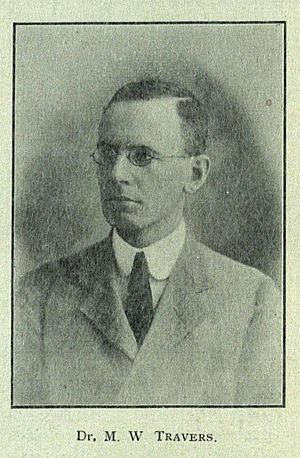Morris Travers facts for kids
Quick facts for kids
Morris Travers
|
|
|---|---|

c. 1909
|
|
| Born |
Morris William Travers
24 January 1872 Kensington, London, England
|
| Died | 25 August 1961 (aged 89) Stroud, England
|
| Awards | Fellow of the Royal Society |
| Scientific career | |
| Fields | Chemistry |
| Institutions | Indian Institute of Science |
Morris William Travers (born January 24, 1872 – died August 25, 1961) was an English chemist. He is famous for working with Sir William Ramsay. Together, they discovered three important gases: xenon, neon, and krypton. Because of his work with these special gases, people in science sometimes called him Rare Gas Travers. He also helped start and became the first director of the Indian Institute of Science.
Contents
Early Life and Education
Morris William Travers was born in Kensington, London. His father, William Travers, was a doctor and a pioneer in clean surgery. Morris went to school in Ramsgate, Woking, and Blundell's School.
Discovering New Gases
After school, Morris Travers went to University College. There, he started working with Sir William Ramsay, a very famous chemist.
Working with Sir William Ramsay
Travers helped Ramsay study gases that had just been found, like argon and helium. They tried to find more gases by heating different rocks and even meteorites. But they didn't find any new ones this way.
Finding Neon, Krypton, and Xenon
In 1898, they tried a new method. They took a lot of liquid air and slowly heated it up. This process is called fractional distillation. As the liquid air heated, different gases boiled off at different temperatures.
- First, they found krypton by looking at the part that boiled last.
- Next, they looked at the argon part and found neon, which boiled at a lower temperature.
- Finally, they found xenon. It was found with krypton but boiled at an even lower temperature.
Travers knew all about this amazing research. Later, in 1956, he wrote a book about Sir William Ramsay's life and discoveries.
Becoming a Professor
In 1904, Morris Travers became a professor at University College. In May of that same year, he was chosen to be a Fellow of the Royal Society. This is a very high honor for scientists in the United Kingdom.
Leading the Indian Institute of Science
In the early 1900s, Sir William Ramsay was asked to help the Indian government. They wanted to create a new science institute in Bangalore. This institute was built with help from the Government of Mysore and a kind person named JN Tata.
Starting a New Institute
Ramsay thought Travers would be a great leader for this new institute. So, in 1906, Travers became the first director of the Indian Institute of Science. The goal was to make it like the Imperial College of Science and Technology in Britain.
Challenges and Departments
Travers faced some challenges while setting up the institute. He had disagreements with the Tata family about how to follow JN Tata's will. However, the institute officially opened in June 1911. It had four main departments:
- General Chemistry
- Organic Chemistry
- Applied Chemistry
- Electrical Engineering
Later Career and Research
When World War I started, Travers returned to Britain. He worked at a company called Duroglass Limited, where he managed the making of glass.
New Companies and Research
In 1920, he started his own company, Travers and Clark Ltd., with F. W. Clark. This company focused on special furnaces that could handle very high temperatures. They also worked on fuel technology, like turning coal into gas.
In 1927, he went back to Bristol. He became an Honorary Professor in Applied Chemistry there.
Cryogenics and Liquid Gases
Travers continued his research in cryogenics. This is the study of how things behave at very low temperatures. He made the first accurate measurements of how cold liquid gases really were. He also helped build several experimental plants in Europe that made liquid air.
Morris William Travers passed away in Stroud, Gloucestershire, in 1961.
See also
In Spanish: Morris Travers para niños
 | William Lucy |
 | Charles Hayes |
 | Cleveland Robinson |

